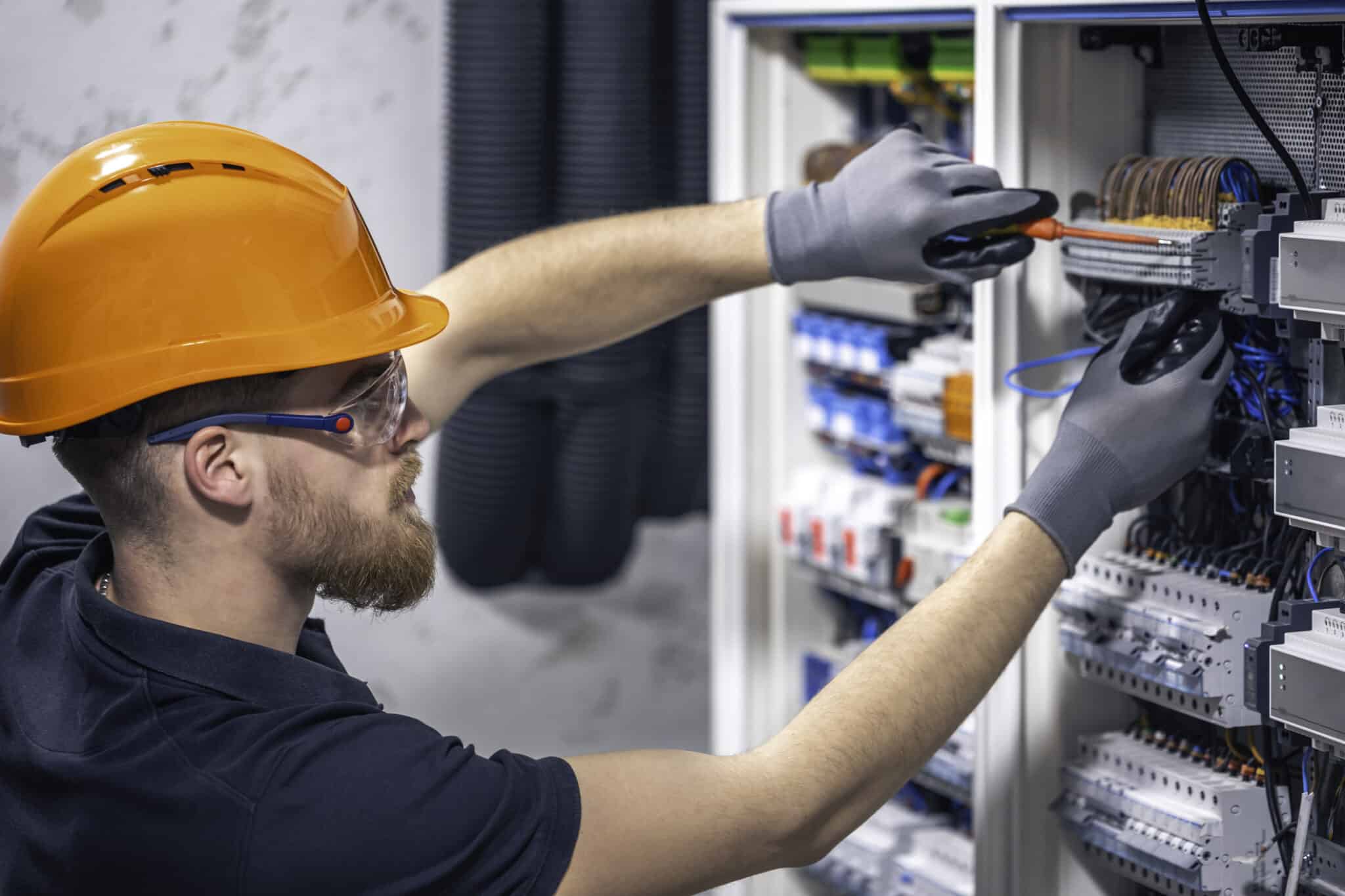Your home’s electrical panels are the heart of your electrical system—if they’re outdated, they could be a ticking time bomb. Your electrical panel distributes power to everything in your home, keeping things running smoothly.
But older panels weren’t built to handle today’s tech-filled homes, which means they can overheat, fail, or even cause fires. In areas like West Columbia, Lexington, Irmo, and Columbia, many older homes still rely on outdated systems, putting homeowners at risk.
What Are Electrical Panels?
Electrical panels are the central hub of your home’s electrical system, responsible for distributing power to every outlet, light, and appliance. They receive electricity from your utility company and divide it into circuits, ensuring everything gets the power it needs.
Inside the panel, circuit breakers or fuses act as safeguards, automatically shutting off power to a circuit if there’s an overload or fault. Modern panels are designed to handle higher energy demands, making them safer and more efficient for today’s homes. Outdated panels, on the other hand, often struggle to manage the load, increasing the risk of electrical issues, inefficiencies, and even fires.

Signs Your Electrical Panel May Be Outdated
1. Frequent Circuit Breaker Trips
If your circuit breakers trip regularly, it is a sign that your electrical panel is overwhelmed by the demands of modern devices. Older panels weren’t designed for today’s energy usage, and frequent trips indicate that the system is struggling to keep up.
This is often caused by outdated circuits that can’t handle high-powered appliances or multiple devices running at once. Ignoring this issue can lead to overheating and potential fire hazards. Upgrading your panel can eliminate this problem, providing a safer and more reliable system.
2. Flickering or Dimming Lights
Flickering or dimming lights are a clear indication that your electrical panel may be outdated or overloaded. These issues occur when circuits are unable to provide consistent power due to old or faulty wiring.
It is especially common in homes with older panels, which struggle to meet the demands of modern electrical loads. This can not only damage your appliances but also pose a safety risk. Addressing the issue with a panel upgrade ensures steady power and protects your home from potential hazards.
3. Burn Marks or Odd Smells
Burn marks or strange odors coming from your electrical panel are serious warning signs that shouldn’t be ignored. These issues often indicate overheating, which could lead to electrical fires if left unchecked.
Outdated panels with worn-out components are more prone to overheating, especially when handling high electrical demands. If you notice these signs, it is crucial to have a professional inspect your panel immediately. Replacing an outdated panel can help prevent dangerous situations and give you peace of mind.
4. Panel Age
The age of your electrical panel is another key factor in determining whether it is outdated. Panels over 25 years old often lack the capacity and safety features needed for today’s electrical standards.
Older panels were designed for homes with far fewer electrical devices and appliances, making them inefficient and unsafe in modern homes. Additionally, they may not comply with current safety codes, which could cause problems during home sales or renovations. Replacing an old panel with a modern one is an investment in your home’s safety and functionality.
5. Lack of Circuit Breakers
Homes with fuse-based electrical panels instead of circuit breakers are at a higher risk of electrical problems. Fuses, while functional, are an outdated technology and can’t provide the same level of safety and convenience as modern breakers.
They’re more prone to overheating and often fail to meet the demands of today’s electrical systems. This increases the likelihood of power interruptions, fire risks, and damaged appliances. Upgrading to a circuit breaker panel ensures better performance and modern safety standards for your home.
Dangers of Outdated Electrical Panels
Fire Hazards
Outdated electrical panels are one of the leading causes of electrical fires in homes. Over time, components wear out and can’t handle the demands of modern electrical usage, leading to overheating and sparking. Panels that are overloaded or have faulty wiring are especially prone to catching fire.
Homes with older panels in areas like West Columbia, Lexington, Irmo, or Columbia are at a higher risk due to the age of the systems. Upgrading your panel significantly reduces the chance of fire, making your home much safer.
Inefficiency
Older panels are not equipped to handle the energy needs of today’s appliances and devices, which makes them highly inefficient. They often fail to provide stable power, causing fluctuations that can damage electronics or disrupt daily activities.
This inefficiency not only affects performance but can also lead to higher energy bills as the panel struggles to keep up. A modern panel ensures consistent power distribution, optimizing energy use and reducing costs. Replacing an outdated panel is a smart step toward a more energy-efficient home.
Electrical Shock Risk
Outdated panels often lack proper grounding, increasing the risk of electrical shocks in your home. When circuits or wires are faulty, they can expose you or your family to dangerous shocks, especially during appliance use or repairs.
Older panels are also more likely to have worn-out insulation or components, further increasing the danger. Modern panels are designed with safety features to prevent these risks and provide a secure environment. Upgrading your panel is an essential step in protecting your family from electrical accidents.
Code Violations
Homes with outdated panels frequently fail to meet modern electrical codes, which can cause problems during home renovations or sales. Electrical codes are updated regularly to improve safety and efficiency, and older panels rarely comply with these new standards.
This can make it difficult to pass inspections or sell your home, as buyers may hesitate to take on the cost of an upgrade. Installing a new panel not only resolves code violations but also adds value to your property by ensuring it meets current regulations.
Why Outdated Panels Struggle With Modern Electrical Demands
Increased Appliance Usage
Modern homes use far more electricity than older panels were designed to handle. From large appliances like refrigerators and HVAC systems to smaller devices like chargers and smart gadgets, the power demand adds up quickly.
Older panels often lack the capacity to manage these loads, leading to frequent tripped breakers and inconsistent power. This is especially common in areas like West Columbia, Lexington, Irmo, and Columbia, where many homes still rely on older systems. Upgrading your panel ensures it can handle the increased usage, keeping your home running smoothly.
Smart Home Integration
With smart homes becoming more common, electrical systems need to be more reliable and robust than ever. Smart thermostats, lighting, security systems, and other devices require a stable and continuous power supply to function correctly.
Older panels are often unable to keep up, resulting in power interruptions or damage to sensitive equipment. By upgrading your panel, you prepare your home to support these technologies seamlessly, making life more convenient and efficient.
Inadequate Circuit Distribution
Outdated panels typically have fewer circuits, which means appliances and devices are often forced to share the same ones. This can lead to overloading, causing lights to flicker or breakers to trip constantly.
Modern panels come with additional circuits that allow better distribution of power, preventing overloads and improving overall efficiency. Adding a new panel isn’t just a safety upgrade; it is also a way to future-proof your home for increasing power demands.
How to Identify if Your Panel Needs an Upgrade
Inspect the Panel
A visual inspection of your electrical panel can reveal clear signs of wear and tear. Look for rust, corrosion, scorch marks, or visible damage on the panel or its components. These issues indicate that the panel has been exposed to moisture, overheating, or age-related wear, all of which compromise its safety and efficiency.
If you notice these problems, it is time to consider an upgrade to avoid potential hazards. Regular checks can help catch these issues early and prevent bigger problems down the line.
Check Your Power Needs
Your home’s power needs may have outgrown the capacity of your current panel. If you’ve added new appliances, a home office, or smart devices, your panel may not be able to keep up. A panel that frequently trips breakers or struggles to maintain consistent power is a clear sign it’s overwhelmed.
Evaluating your current and future power needs is essential to ensure your system can handle the load. Upgrading to a modern panel provides the capacity and flexibility needed for a growing household.
Consult a Professional
While you can spot some issues on your own, a professional electrician is the best resource for evaluating your panel. They can assess its age, condition, and capacity, as well as check for any code violations.
Professionals use tools and expertise to detect problems that might not be visible to the untrained eye. An electrician can also recommend the right panel size and features for your home’s specific needs. Investing in a professional evaluation is a smart step toward a safer, more efficient electrical system.
Benefits of Upgrading Your Electrical Panels
Improved Safety
One of the biggest benefits of upgrading your electrical panels is the enhanced safety they provide. Modern electrical panels are equipped with updated technology that reduces the risk of overheating, electrical fires, and shocks. Outdated electrical panels, with worn components or insufficient capacity, can become dangerous over time, especially in homes with increasing power demands.
New electrical panels ensure proper grounding and reliable circuit protection, giving you peace of mind. Protecting your family and home from potential hazards caused by faulty electrical panels is well worth the investment.
Enhanced Efficiency
Upgraded electrical panels are better equipped to handle the energy demands of modern appliances and devices. This means fewer interruptions, such as flickering lights or tripped breakers, and more consistent power for everything you use.
By distributing electricity more effectively, modern electrical panels also reduce energy waste, helping lower your utility bills. If you’re looking for efficient and dependable electrical panels, upgrading is a step in the right direction. Efficiency is especially crucial in today’s tech-reliant households, making reliable electrical panels essential.
Increased Home Value
Upgrading your electrical panels not only benefits your current lifestyle but also boosts the value of your home. Potential buyers are often concerned about outdated electrical panels, as they pose safety risks and added costs. Modern, up-to-code electrical panels reassure buyers and make your home more appealing on the market.
This upgrade is a selling point, especially in areas like West Columbia, Lexington, Irmo, and Columbia, where older homes with outdated electrical panels are common. Investing in upgraded electrical panels is an improvement that pays off in both safety and resale value.
Future-Proofing
As technology evolves, your home’s electrical demands will likely increase, making modern electrical panels essential. Whether you’re adding more appliances, integrating smart home technology, or considering renewable energy sources like solar panels, upgraded electrical panels prepare you for the future.
Modern electrical panels provide additional capacity and flexibility to meet growing needs without overloading circuits. Future-proofing your home with dependable electrical panels ensures it can adapt to advancements while staying safe and efficient for years to come.

What to Expect During an Electrical Panel Upgrade
Professional Assessment
Upgrading your system starts with a professional assessment by a professional electrician. They evaluate the condition of your current panel to determine if it meets safety standards or requires replacement. The inspection includes identifying signs of wear, inadequate capacity, or outdated technology.
Additionally, your home’s power needs are reviewed to ensure the new setup can handle modern demands. A professional assessment guarantees that the upgrade will be safe and effective.
Installation Process
Upgrading your electrical panels is a step-by-step process designed to improve your home’s safety and power reliability. Here’s what to expect during the upgrade:
- Power Disconnection: The electrician first disconnects your home’s power to ensure a safe work environment. This step prevents any risk of electrical shocks during the upgrade.
- Old Panel Removal: The outdated panel is carefully removed to prepare for the new installation. This ensures all old or damaged components are replaced with modern, reliable ones.
- New Panel Installation: A modern panel is installed to enhance the system’s safety and efficiency. This upgrade ensures your home can handle today’s power demands with ease.
- Circuit Reconnection: Each circuit is securely reconnected to the new panel for proper functionality. The electrician ensures all connections meet safety standards.
- Final Checks: The grounding system is verified, and the new setup is rigorously tested. This ensures the panel complies with local codes and delivers consistent performance.
Once completed, your upgraded electrical system will provide greater efficiency and peace of mind for years to come.
Time and Cost
The time and cost of a panel upgrade vary based on the size of the system and the complexity of the installation. Most upgrades are completed within a few hours to a day. The cost depends on factors like the number of circuits, amperage required, and whether additional wiring is necessary.
While it is an investment, upgrading your system provides long-term benefits, including enhanced safety, efficiency, and reliability. A professional electrician can give you an accurate estimate based on your specific needs.
Ready to Upgrade Your Electrical Panels?
Don’t let outdated electrical panels put your home at risk! At Mister Sparky of Columbia, we specialize in safe and efficient panel upgrades for homes in West Columbia, Lexington, Irmo, and Columbia.
Our professional electricians ensure your system meets today’s demands, providing reliability and peace of mind. Contact us today to schedule your upgrade and take the first step toward a safer, smarter home!
Frequently Asked Questions (FAQ)
How can I tell if my electrical panel is too old?
If your panel is over 25 years old or has visible signs of wear like rust, scorch marks, or outdated components, it’s likely too old. Frequent circuit breaker trips and difficulty handling modern appliances are also strong indicators that it’s time for an upgrade.
Are fuse boxes dangerous?
While not inherently dangerous, fuse boxes are outdated and less safe compared to modern circuit breaker systems. They’re more prone to overheating and can’t handle the electrical demands of today’s homes, increasing the risk of fire or damage.
What size panel do modern homes need?
Most modern homes require a 200-amp panel to handle the electrical load of appliances, HVAC systems, and smart devices. Larger homes or those with significant energy needs may require even more capacity to stay efficient and safe.
Can I upgrade my electrical panel myself?
No, upgrading a panel is a job for a professional electrician. It involves handling high-voltage components and ensuring compliance with local codes, making it unsafe and illegal for untrained individuals to perform the work.
What factors influence the complexity of an upgrade?
The complexity of an upgrade depends on factors such as the size of the panel, the number of circuits required, and whether additional work like grounding or wiring is necessary. Consulting with a professional will help you understand the specific needs of your system.




